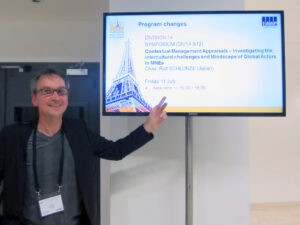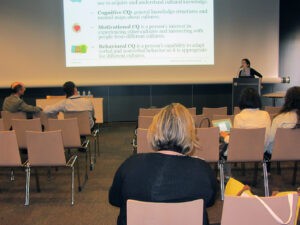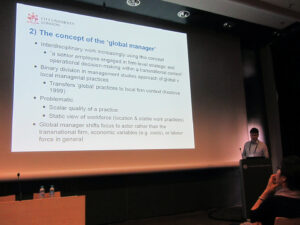Four members of SIEM presented at the International Congress of Applied Psychology (ICAP) 2014 in Paris on July 11th. Dr. Ming Li of Hull University led the presentations with a discussion of the impact of personality factors on cognitive intelligence. Dr. Andrew Jones of London City College was the second speaker with his topic the impact of personality on the success of international business managers. Third was Professor Will Baber of Kyoto University presenting evidence that the improving skills of individual managers in cross cultural situations contribute to the success of the companies they work for. Finally, Dr. Rolf Schlunze of Ritsumeikan University provided a summarizing presentation describing the SIEM model. The model shows how preferences in the corporate environment moderated by cultural adjustment and networking contribute to the success of managers and the firms they work for. The presentations lead to the implication for businesses that a focus on linkages in the workplace and marketplace matters!
Ming Li, led the session showing impact of personality on CQ on a manager’s ability to manage effectively across cultural boundaries. The Big Five personality traits are increasingly seen to work together and are not free standing constructs. Four hypotheses tested the relationship of openness and agreeability on CQ. The findings suggest that openness may translate into higher levels of cultural intelligence when international managers are more interpersonally sensitive; a manager’s ability to manage effectively across cultural boundaries is determined by multiple personality traits acting in concert, not in isolation.
Andrew Jones followed up closely on Ming Li’s topic showing how personality individual understanding and values play roles among global managers. These managers form a global outlook that contributes to their success as managers in intercultural contexts. Specific observation of business managers as individual actors in China suggests that a process that differs from the firm centered transfer of knowledge model widely discussed in the academic world.
Will Baber provided evidence based on initial responses to his survey of North American (US and Canadian) managers in Japan linking the SIEM model to Cognitive Intelligence. The SIEM model shows that managers with high acculturation have higher personal success while their organizations also experience higher successes than competitors. Specifically, Baber’s preliminary research presented at ICAP suggests that high CQ and negotiation ability with local staff and suppliers boost the impact of acculturation on the manager’s organization. Interviews with North American managers revealed that many had distinct changes in their thinking and understanding of situations, people, behavior, and strategies for success.
Professor Dr. Rolf D. Schlunze introduced his work entitled Cultural Competence Creates Synergy – Successful International Managers’ Mindscape viewed by Networking and Preferences in the Corporate, Market and Living environment. Previous research showed that international managers need to make a conscious effort and adapt to local systems and managerial practices. The aim of his studies was to investigate the performance of expatriated managers by their preferences and networking practices in the corporate, market and living environments. The hypothesis of this research says that managers perform better when they do have a preference to connect and serve clients and customers in purpose to create new market opportunities and do an appropriate to adjust to the cultural environment facilitating human resources and creating workplace harmony. The behavioral orientation of 150 executive managers was analyzed. The results show that managers who can develop business relations with cultural competence within the intercultural workplace perform better and sustain the company success. They are actively involved in the decision making of the local overseas subsidiary. They succeed to perform well in the market by cultural exchange promoting good cross-cultural practices in their workplace. To summarize, lived cultural experience and positive feedback towards embedding efforts in the workplace are crucial for market success. The results imply that the cultural fluent managers do create synergy because they feel integrated into the local business community. Thus, multinational companies need to consider psychological and cultural training for overseas assignments as an important investment in their long-term profitability.
The audience included Prof. Sharon Glaser who commented all four presentations. All presenters are grateful for her questions and suggestions. Her academic and strategic thinking is admirable. We will follow her advice that we participate in the upcoming International Conference of Cross-cultural Psychology. We are extending knowledge into cognitive studies and hope to develop a contextual management appraisal based on a consistent theoretical framework. Her work is very valuable to SIEM and we encourage our members to review her activities at URL http://www.casl.umd.edu/sharon-glazer.
Additionally, Rolf Schlunze summarized in an E-Poster session that recent joint research work found that despite their advantages in culture, language skills, and knowledge, Chinese entrepreneurs and managers in Japan sometimes lack well developed sources and techniques for gathering information when needed. Although gunaxi networking of ethnical Chinese can be very powerful globally they face difficulties to connect within Japan. Further research needs to investigate to what extent the business environment itself is open or hostile to international entrepreneurship. SIEM is grateful to Prof. Christine Roland-Levy, the president of the 28th ICAP, who honored us with an invitation to the conference dinner for our work in managing the workshop WK11 that was suddenly canceled. (We do not take any responsibility for those who registered and expected to receive the software of the original workshop organizer.) We introduced our research results and methodology using VennMaker for social networks analysis. For those who wish to pursue similar analyses we recommend visiting the homepage entitled VennMaker: An Actor-Centered Interactive Network Mapping Tool at URL http://www.vennmaker.com/
 Dr Rolf Schlunze organizes SIEM session at ICAP in Paris |
 Dr. Ming LI explains Cultural Intelligence (CQ) |
 Dr. Andrew Jones: Concept of the Global Manager |
 Enjoying conference dinner together with IAAP President, Pr. Christine Roland-Lévy |
